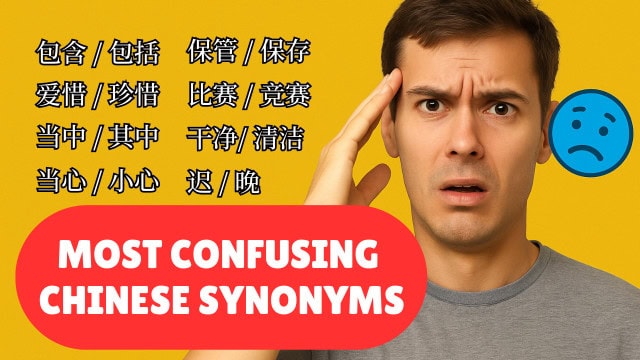Some Chinese words look or sound really similar, but they actually mean different things. Chinese synonyms can confuse a lot of learners—and it’s totally normal! If you’ve ever wondered what the difference is between 包含 and 包括, or when to say 爱惜 instead of 珍惜, this guide is for you.
We’ll go through 8 pairs of Chinese synonyms words that people often mix up. They’re words you’ll hear and use a lot, like 比赛 and 竞赛 (both mean “competition”), or 清洁 and 干净 (both about being clean). We’ll explain the small differences so you know when to use each one.
You’ll also learn the difference between 当心 and 小心 (both mean “be careful”), 迟 and 晚 (both mean “late”), and other tricky pairs like 保管 vs. 保存 (both about keeping or storing something).
By understanding these 8 pairs of Chinese synonyms, you’ll avoid mistakes and sound more natural when speaking Chinese. Ready to stop mixing them up?

1. 包含/包括
“包含” (bāo hán) emphasizes the idea of “containing within” or “something existing inside”, and is mostly used for abstract things, such as meaning, emotions, information, or content.
“包括” (bāo kuò) focuses on covering or listing all components or members of a group, and is typically used for concrete items, such as people, objects, or categories.
她说的话包含着两层意思。
Tā shuō de huà bāo hán zhe liǎng céng yì si.
Her words carry two layers of meaning.
你的差旅费包括交通费、住宿费和餐费。
Nǐ de chā lǚ fèi bāo kuò jiāo tōng fèi, zhù sù fèi hé cān fèi.
Your travel expenses include transportation, accommodation, and meals.
2. 爱惜 / 珍惜
爱惜 ( ài xī) is To take good care of and value something; to avoid wasting or damaging it. Commonly used with: time, resources, health, life, objects, etc.
珍惜 (zhēn xī) mean to really treasure something because it’s special or rare, like a precious gift or a meaningful relationship. “珍惜” show a deeper level of care than “爱惜. Commonly used with: relationships, opportunities, time, life, feelings, etc.
时间宝贵,我们要懂得爱惜/珍惜。
Time is precious, and we should know how to cherish it.
Shí jiān bǎo guì, wǒmen yào dǒng de ài xī/zhēn xī
玛丽很珍惜她和丽丽的友情。
Mary treasures her friendship with Lily.
Mǎlì hěn zhēn xī tā hé Lìlì de yǒu qíng.
3. 清洁 干净
清洁 (qīng jié)means there’s no trash, dust, or dirt around. .
干净 (gān jìng) means everything is clean and hygienic, but it can also describe things like speech or writing that is clear, polite, and to the point. Appropriate, civilized, concise, and not vulgar.
干净 can be used as a complement, but “清洁” cannot.
卧室要保持干净/清洁才能睡得舒服。
The bedroom should be kept clean to sleep comfortably.
Wò shì yào bǎo chí gān jìng/qīng jié cái néng shuì dé shū fú.
他的文章写得干净利落。
His writing is clean and concise.
Tā de wén zhāng xiě de gān jìng lì luò.
4. 保存 / 保管
保存 and 保管 both has the meaning of keeping something going or to keep it around. 保存 (bǎo cún) means keeping tangible things such as food, data etc safe, while 保管 (bǎo guǎn) is more about being in charge of the things or looking after them.
请保存好这些文件。
Please save these files properly.
Qǐng bǎocún hǎo zhè xiē wén jiàn.保存 emphasizes saving, often in a digital or data-related context.
请保管好这些文件。
Please keep these files safe.
Qǐng bǎo guǎn hǎo zhè xiē wén jiàn.保管 emphasizes safekeeping, typically for physical items.
保管 has the meaning of I guarantee it” or “for sure” in English, but 保存 cannot be used this way.
A:这菜是根据你的喜好做的。
This dish was made according to your preferences.
Zhè cài shì gēn jù nǐ de xǐ hào zuò de.B:保管你爱吃。
I guarantee you’ll like it.
Bǎo guǎn nǐ ài chī.
5. 比赛/竞赛
比赛 (bǐ sài) is used when people compete to see who wins or loses — like in sports or games.
竞赛 (jìng sài) is more about comparing who does better or ranks higher — like in school contests or work-related competitions.
So, 比赛 is common in fun or physical activities, while 竞赛 is often used in learning or job-related situations.
比赛 can take a direct object, but 竞赛 usually does not.
我昨晚看了一场精彩的篮球比赛。
I watched an exciting basketball game last night.
Wǒ zuó wǎn kàn le yì chǎng jīng cǎi de lán qiú bǐ sài.
她在学校的数学竞赛中获得冠军。
She won first place in the school’s math competition.
Tā zài xué xiào de shù xué jìng sài zhōng huò dé guàn jūn.
6. 当心/小心
小心 (xiǎo xīn) means you should pay attention and be cautious, usually to avoid danger or mistakes. You can use it on its own or with something specific.
当心 (dāng xīn) is to Look out / Watch out. It’s very similar to 小心, but often used when there’s immediate danger or something to warn someone about.
小心 can be used as both a verb and an adjective, while “当心” is only used as a verb. When used as verbs, they often mean the same thing and can be used interchangeably.
However, since 当心 is only a verb, it can’t be used like an adjective, and can’t be modified by negative adverbs like “不” or “没”.
吃鱼时要小心 / 当心鱼刺。
Be careful / Watch out for fish bones when eating fish.
Chī yú shí yào xiǎo xīn / dāng xīn yú cì.
过马路时要当心 / 小心。
Be careful when crossing the road.
Guò mǎ lù shí yào tè bié dāng xīn / xiǎo xīn.
他一不小心掉进了水里。
He accidentally fell into the water.
Tā yī bù xiǎo xīn diào jìn le shuǐ lǐ.Only 小心 is used in this grammar pattern — “一不小心…” means “by accident” or “due to carelessness.”
7. 当中 / 其中
当中 (dāng zhōng) means “among” or “in the middle of.” You can use it to talk about being part of a group or in the middle of something. or It can also mean being in the middle of doing something, especially in formal situations.
其中 (qízhōng) means “among them” or “among the ones mentioned”. It only refers to people or things, not activities or processes.
当中” and “其中” are not interchangeable because they have different meanings and are used in different situations.
别去打扰她,她还在练习当中。
Don’t bother / disturb her, she’s still in the middle of practicing.
Bié qù dǎrǎo tā, tā hái zài liàn xí dāng zhōng.
你有那么多包,你能给我其中一个吗?
You have so many bags, can you give me one of them?
Nǐ yǒu nà me duō bāo, nǐ néng gěi wǒ qí zhōng yí gè ma?
8. 迟 / 晚
晚 (wǎn) means late in time (like the opposite of “early”). It is used to describe time of day or a general sense of lateness like morning, afternoon, or night.
迟 (chí) is used when someone or something is late for an event, deadline, appointment, etc. It is more about missing a time you were supposed to be on time for
他今天店里很忙所以来晚了。
Tā jīn tiān diàn lǐ hěn máng suǒ yǐ lái wǎn le.
He was very busy in the shop today, so he came late.
他今天店里很忙所以迟到了。
Tā jīn tiān diàn lǐ hěn máng suǒ yǐ chí dào le.
He was very busy in the shop today, so he was late (for the event).(Late for an event, not just about time)
他昨天开夜车所以晚起了。
Tā zuó tiān kāi yè chē suǒ yǐ wǎn qǐ le.
He stayed up late working yesterday, so he got up late today.(Late waking up, the opposite of getting up early — 早起)
迟起 is incorrect because 迟 is used for being late for an event or scheduled time, not for waking up.
For video presentation of this post, click HERE.
